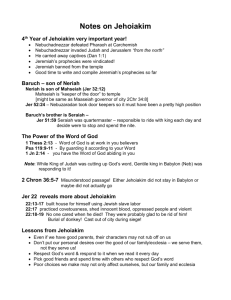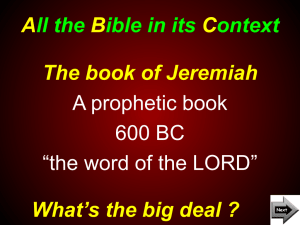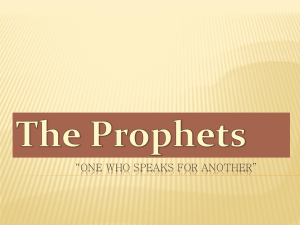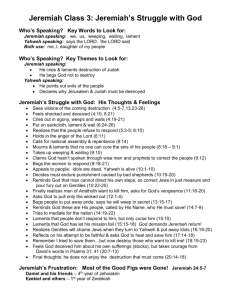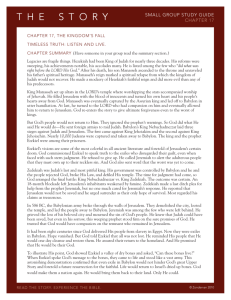Bible 110 Old Testament A. Judah in the 7
advertisement
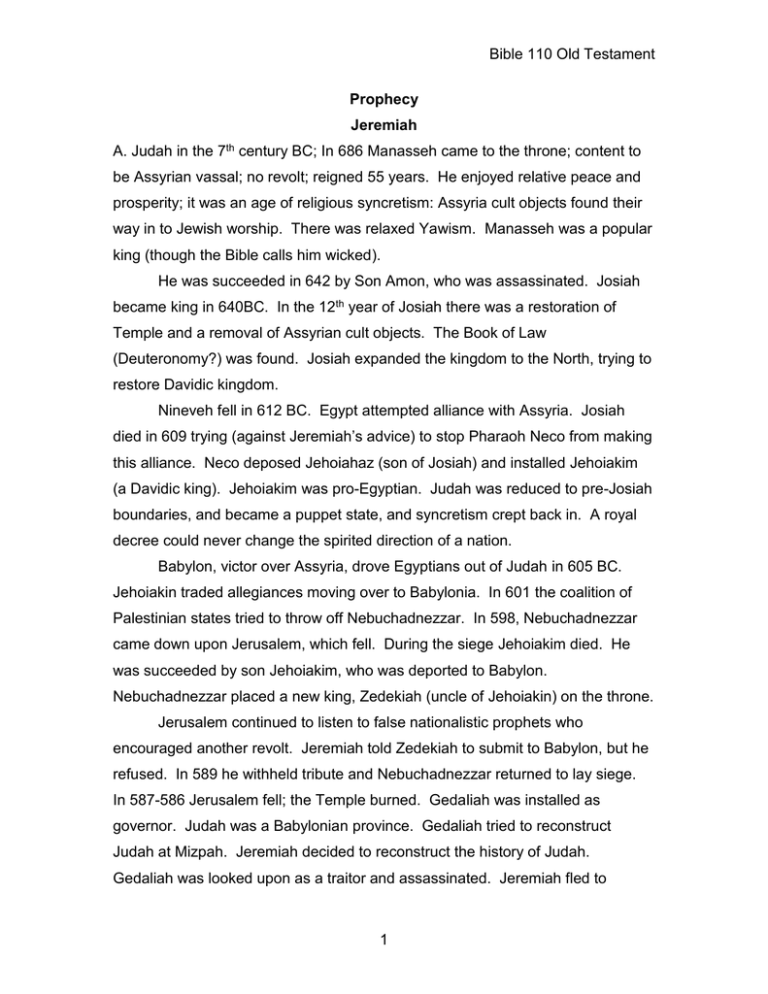
Bible 110 Old Testament Prophecy Jeremiah A. Judah in the 7th century BC; In 686 Manasseh came to the throne; content to be Assyrian vassal; no revolt; reigned 55 years. He enjoyed relative peace and prosperity; it was an age of religious syncretism: Assyria cult objects found their way in to Jewish worship. There was relaxed Yawism. Manasseh was a popular king (though the Bible calls him wicked). He was succeeded in 642 by Son Amon, who was assassinated. Josiah became king in 640BC. In the 12th year of Josiah there was a restoration of Temple and a removal of Assyrian cult objects. The Book of Law (Deuteronomy?) was found. Josiah expanded the kingdom to the North, trying to restore Davidic kingdom. Nineveh fell in 612 BC. Egypt attempted alliance with Assyria. Josiah died in 609 trying (against Jeremiah’s advice) to stop Pharaoh Neco from making this alliance. Neco deposed Jehoiahaz (son of Josiah) and installed Jehoiakim (a Davidic king). Jehoiakim was pro-Egyptian. Judah was reduced to pre-Josiah boundaries, and became a puppet state, and syncretism crept back in. A royal decree could never change the spirited direction of a nation. Babylon, victor over Assyria, drove Egyptians out of Judah in 605 BC. Jehoiakin traded allegiances moving over to Babylonia. In 601 the coalition of Palestinian states tried to throw off Nebuchadnezzar. In 598, Nebuchadnezzar came down upon Jerusalem, which fell. During the siege Jehoiakim died. He was succeeded by son Jehoiakim, who was deported to Babylon. Nebuchadnezzar placed a new king, Zedekiah (uncle of Jehoiakin) on the throne. Jerusalem continued to listen to false nationalistic prophets who encouraged another revolt. Jeremiah told Zedekiah to submit to Babylon, but he refused. In 589 he withheld tribute and Nebuchadnezzar returned to lay siege. In 587-586 Jerusalem fell; the Temple burned. Gedaliah was installed as governor. Judah was a Babylonian province. Gedaliah tried to reconstruct Judah at Mizpah. Jeremiah decided to reconstruct the history of Judah. Gedaliah was looked upon as a traitor and assassinated. Jeremiah fled to 1 Bible 110 Old Testament Egypt? Only peasants were left in the land. The leaders were deported. Some kind of worship continued in the ruins of the Temple. Jeremiah worked during Jehoiakim-Zedekiah years. His book is unique because it is filled with his personality. Much of it was dictated to Baruch. B. Date and structure: superscription (Jer 1:1-3) born 650 BC. Called of God in 626 BC. Foe from the north would have been Scythians, 630-628. Jeremiah changed his message to deal with Babylonia in 605. First dated message is 609 (Jer 26). 626-609 are “silent years” of Jeremiah. Structure is complicated; not chronologically, but some passages are arranged chronologically. Some have a typical arrangement (Ch 21-23). Some of Jeremiah’s messages were rewritten in prose. There was Deuteronomic editing of Jeremiah (e.g. Ch 7). There is supposition that Baruch was responsible for the initial collection of Jeremiah (Ch 1-44). Deuteronomic and other editions added Chs 45-52. Jeremiah was from a priestly family of Anathoth. He was not of the Jerusalem priesthood or a cult prophet. He was from the “wrong side of the tracks.” He almost loses his life because of what he says. Denunciation begins in Ch 36 (605 BC). Jehoiakim got the scroll, read it, and burned it. Jeremiah dictated the scroll again (36:27) It deals with externals of religion. Jeremiah tries to puncture the balloon of the nationalistic prophet; to lessen dependence on external forms of religion. God’s blessing is not tied to externals. Jeremiah criticized dependence on the Temple (he got in trouble). He saw the Babylonians as instruments of God. He called Nebuchadnezzar a “servant of Yahweh (25:9.)” Jeremiah was not a prophet of repentance; his doom was sealed. Jeremiah dealt with the false security of Jerusalem’s citizens. He also dealt with acute spiritual depression. Confessions of Jeremiah area a unique feature. He was opposed by his parents, prophets, and kings. Why am I so bitterly opposed if I am God’s mouth piece? (Jer 11:18-19; 12:1-3; 15:10-21; 20:7-12, 14-18). Why do the righteous suffer? He prays for destruction of those who oppose him. He questions God’s government of the world; lives in despair, cursing the day of his birth. He cursed the day of his call. 2 Bible 110 Old Testament God never answered Jeremiah the way he wanted to be answered. God never praised or consoled Jeremiah. He tells him not to give up but to stick with it (12:5). In 20:9 the prophet’s freedom is in focus. He could have ceased being the man of God, but instead he gained new courage to face opposition. C. Reconstruction for Jeremiah (during governorship of Gedaliah) The cult barely functioned; Jeremiah gave hope to exiles in Babylon to build true religion. 1. Jer 29 – letter to exiles telling them that God would be heard in Babylon. Settle down there. 2. Jer 24 – Things in Jerusalem hadn’t changed too much. God was blessing those who remained? Actually they were rotten figs. 3. Jer 32-40 – Biographical audiences with Zedekiah. As Jeremiah sought to reconstruct Judah, he never lost hope for restoration of the nation (Ch31). He speaks in nationalistic context purged of all presupposition. Nation is no longer the unit but the sphere of religion. 31:31ff - new covenant made with Israel and Judah. Character of covenant is different because of internal motivation based on a direct encounter with God. New covenant is both individual and social. 3
